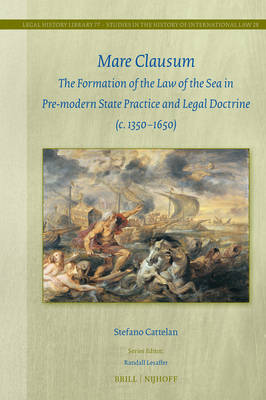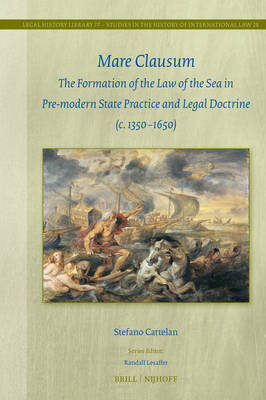
- Afhalen na 1 uur in een winkel met voorraad
- Gratis thuislevering in België vanaf € 30
- Ruim aanbod met 7 miljoen producten
- Afhalen na 1 uur in een winkel met voorraad
- Gratis thuislevering in België vanaf € 30
- Ruim aanbod met 7 miljoen producten
Zoeken
Mare Clausum: The Formation of the Law of the Sea in Pre-Modern State Practice and Legal Doctrine (C. 1350-1650)
Stefano Cattelan
€ 230,45
+ 460 punten
Omschrijving
Who owns the sea? This book explores this timeless question by tracing the development of claims over the sea from the late Middle Ages to the early modern era, shedding light on the complex interplay between legal arguments, political interests, and geostrategic realities. By the time Hugo Grotius's Mare liberum (1609) famously championed the freedom of the seas, competing traditions of 'claimed seas' had already shaped European legal debates for centuries. Examining three macro-regions - the Mediterranean, the seas of Northern Europe, and the world oceans - this study challenges the dominant Grotius-centric narrative, offering a broader perspective on how political actors and jurists justified exclusive maritime rights long before John Selden's Mare clausum (1635). While assessing the Eurocentric foundations of the modern law of the sea, it reveals how historical legal arguments and notions continue to shape contemporary ocean governance.
Specificaties
Betrokkenen
- Auteur(s):
- Uitgeverij:
Inhoud
- Aantal bladzijden:
- 408
- Taal:
- Engels
- Reeks:
- Reeksnummer:
- nr. 77
Eigenschappen
- Productcode (EAN):
- 9789004741393
- Verschijningsdatum:
- 13/11/2025
- Uitvoering:
- Hardcover
- Formaat:
- Genaaid
- Afmetingen:
- 155 mm x 235 mm
- Gewicht:
- 802 g

Alleen bij Standaard Boekhandel
+ 460 punten op je klantenkaart van Standaard Boekhandel
Beoordelingen
We publiceren alleen reviews die voldoen aan de voorwaarden voor reviews. Bekijk onze voorwaarden voor reviews.








